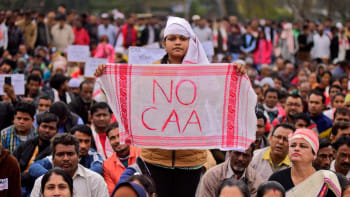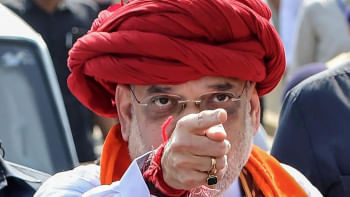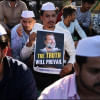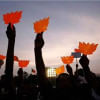Will BJP’s infiltration pitch in Bengal and Assam pay off?

That infiltration from India's border with Bangladesh has become a key component of Bharatiya Janata Party's strategy for assembly elections in the eastern state of Jharkhand has been evident in the last one month or so. Several top leaders of the party, including Prime Minister Narendra Modi, Home Minister Amit Shah, and Assam Chief Minister Himanta Biswa Sarma during their campaigns in Jharkhand, made a strong pitch on the infiltration issue.
That the saffron party is going to apply the same strategy in the next assembly elections in West Bengal and Assam due in 2026 was indicated at separate events by Shah in West Bengal and Sarma in Guwahati on October 27. The events appeared to be a well-coordinated move to amplify the infiltration issue in public discourse in the two states, which share borders with Bangladesh and where illegal immigration has long been an issue.
The BJP considers West Bengal as the final frontier to capture in its political surge in eastern India. Shah, making his first visit to West Bengal since the previous national elections in which BJP put up a below-par performance getting fewer seats compared to 2019, flagged the subject of cross-border infiltration. Inaugurating a newly-built passenger terminal and a cargo movement gate "Maitri Dwar" at Petrapole in India opposite Benapole in Bangladesh on the morning of October 27, Shah urged West Bengal voters to bring BJP into power in the 2026 assembly elections to put an end to the infiltration.
Hours later at a BJP-organised event in Kolkata, Shah brought up the issue once again accusing West Bengal's Mamata government of being involved in "state-sponsored infiltration" and corruption. He stressed the need to elect a BJP government with two-third majority to address the issues. There are two important aspects of Shah's remarks: (1) he contended the lack of a legal framework for cross-border movement of people that has led to infiltration; and (2) he framed the infiltration issue in terms of peace and development and better relations with Bangladesh. "Peace in West Bengal can only be established when the support for illegal infiltration is stopped and it comes to a complete halt, which will usher in a new era of partnership with neighbouring countries," he added.
On the same day in Guwahati, Sarma told a press conference that Indian states bordering Bangladesh must coordinate among themselves and with the Border Security Force (BSF) to foil infiltration bids in the wake of the political turmoil in the neighbouring country. He said while the governments in Assam and adjacent Tripura ruled by BJP are already working together with the BSF, Mamata's government need to cooperate and identify the infiltrators because those sent back to Bangladesh from Assam and Tripura may re-enter through Bengal.
While the BJP dispensations in Assam and Tripura easily deal with the BSF in checking infiltration from across the border, it is not that smooth in West Bengal where the Mamata administration and border guards are often at loggerheads on the issue. The BJP accuses the Bengal government of not adequately cooperating with the BSF in checking infiltration for Muslim "vote-bank" politics; BJP also charges the TMC with sheltering the infiltrators. The TMC says it is the duty of the BSF, controlled by the central government, to ensure infiltration does not take place. The Mamata government had opposed the expansion of the BSF's jurisdiction deeper in the state for its operations against cross-border crimes. The BSF suspects those indulging in these crimes often find protection in the state.
Infiltration likely occupied a substantial part of both Shah and Sarma's recent speeches because BJP (at least in Assam) was not exactly happy with the recent ruling by the Supreme Court's Constitution bench. The ruling upheld the validity of Clause 6A of the Citizenship Act, 1955, which gives a cut-off period for giving Indian citizenship to those who migrated from erstwhile East Pakistan and later Bangladesh. The Assam chief minister made no secret of his desire to see the cut-off year to be 1951 to identify illegal immigrants rather than March 25, 1971, the day when the Bangladesh's Liberation War began.
The BJP has been using the infiltration issue as a political tool to project its Hindutva theme. However, Sarma claimed on October 27 that those trying to enter India illegally were Rohingyas and not Hindus and that "the perception about Hindu Bengalis trying to come is wrong". He said, "We are least bothered about the religion of the infiltrators. Our focus is if someone comes illegally, he or she must be pushed back." While such a religion-neutral articulation by Sarma is politically rewarding for the BJP in Ahom-majority Assam, the challenge for the party is how to reconcile it with its Hindutva plank. Therein lies the party's dilemma.
Pallab Bhattacharya is a special correspondent for The Daily Star. He writes from New Delhi, India.
Views expressed in this article are the author's own.
Follow The Daily Star Opinion on Facebook for the latest opinions, commentaries and analyses by experts and professionals. To contribute your article or letter to The Daily Star Opinion, see our guidelines for submission.

 For all latest news, follow The Daily Star's Google News channel.
For all latest news, follow The Daily Star's Google News channel. 










Comments